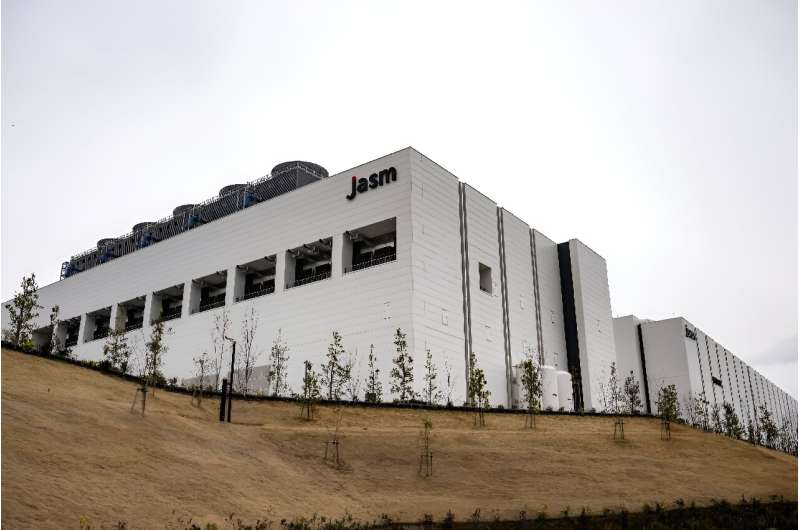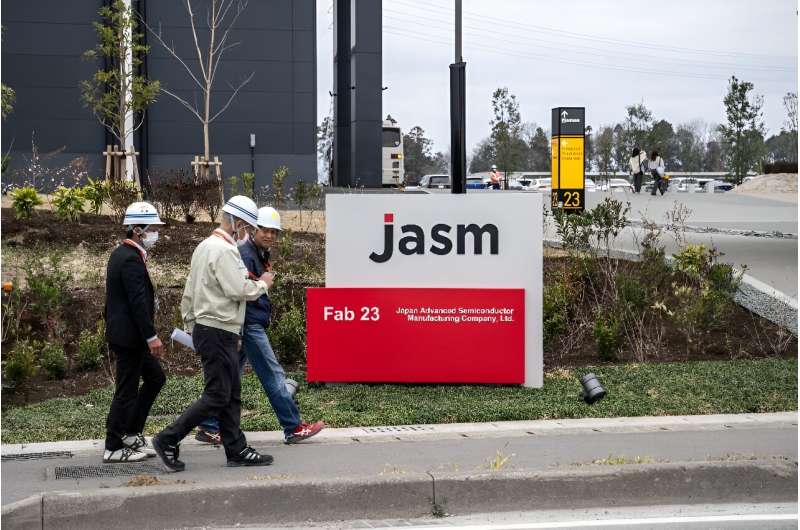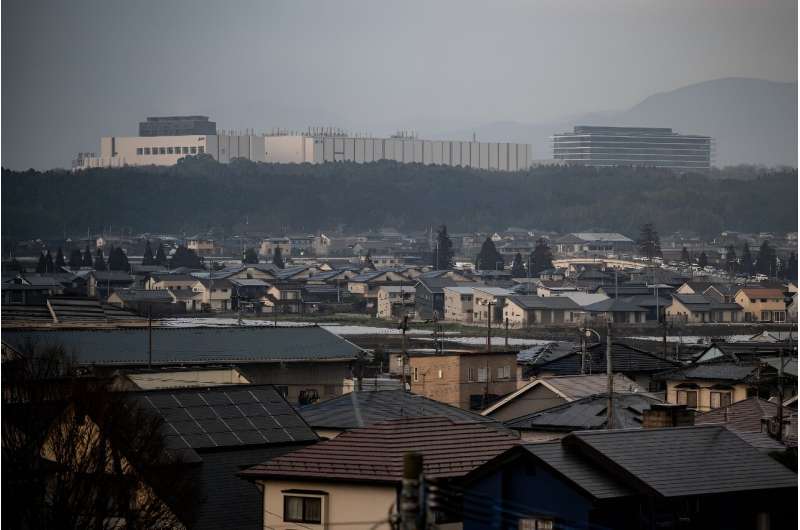This article has been reviewed according to Science X's editorial process and policies. Editors have highlighted the following attributes while ensuring the content's credibility:
fact-checked
reputable news agency
proofread
Chip giant TSMC shifts away from hotspot Taiwan with Japan plant

TSMC's new chip plant in Japan will help assure global supplies of the crucial hardware, the Taiwanese giant's founder Morris Chang said Saturday as the $8.6-billion factory was officially opened.
Taiwan Semiconductor Manufacturing Company, which counts Apple and Nvidia as clients, produces half the world's chips, used in everything from smartphones to satellites and increasingly to power AI technology.
But TSMC's customers, as well as governments concerned about supplies of semiconductors vital to their economies and defence, want the firm to make more chips away from the self-ruled island.
China's increasing assertiveness towards Taiwan—which it claims as its own territory and has not ruled out taking by force—has sparked worries about the world's dependence on the island for chip production and pushed TSMC to diversify where it makes them.
The factory on the southern Japanese island of Kyushu "will, I believe, improve the resiliency of chip supply for Japan and for the world," 92-year-old Chang said at Saturday's ceremony, in a rare public appearance.
"It will also, I believe, start a renaissance of semiconductor manufacturing in Japan," Chang said.
The new plant in Japan is "the most significant TSMC international investment to open in many years", said Chris Miller, author of "Chip War: The Fight for the World's Most Critical Technology".
"It will also solidify the political relationship between Taiwan and Japan at a time when Taiwan is looking to make sure it's got powerful friends that can help it stand up to Chinese pressure," Miller told AFP.

State sweeteners
TSMC's new facility is also a coup for Japan as it vies with the United States and Europe to woo semiconductor firms with huge subsidies.
Prime Minister Fumio Kishida told the opening ceremony that Japan was "now being positioned as an important foothold in TSMC's world strategy."
"I have high hopes too that the economic exchange between Japan and Taiwan will be made more vibrant," he said.
Firms like Toshiba and NEC helped Japan dominate in microchips in the 1980s but competition from South Korea and Taiwan saw its global market share slump from more than 50 percent to around 10 percent.
Now Japan is making available up to four trillion yen ($26.7 billion) in state sweeteners to help triple the sales of domestically produced chips to more than 15 trillion yen by 2030.
The new TSMC plant in the town of Kikuyo, for which the government pledged more than 40 percent of the costs—Sony and Denso are also on board—is just the first.
With "strong" Japanese government support, TSMC this month announced a second facility, to make more advanced chips, and is reportedly eyeing a third and even a fourth.
Others getting state funds include Kioxia, Micron and Rapidus, an ambitious joint venture involving IBM and Japanese firms for state-of-the-art two-nanometre logic chips.

Welcome banners
TSMC is building a second factory in the US state of Arizona and plans another in Germany, its first in Europe.
But Japan has the advantage of being geographically closer, has a wealth of experience in the sector and, for the Kikuyo plant at least, which took 22 months to build, is fast.
By contrast, in the United States, which has announced subsidies of $52.7 billion to boost its own sector, the Arizona plant has been delayed and has seen disputes with unions.
"I have seen many factories being built by various companies, but TSMC was built with remarkable speed," Taro Imamura, a local official in Kikuyo, told AFP.
"Everyone in town, from children to the elderly, now knows the words 'chips' and 'TSMC'," Imamura said at Kikuyo's town hall, where a banner reads "We welcome TSMC workers".
The Kumamoto area of Kyushu is already a hub for Japanese semiconductor companies, including makers of machines for chip fabs like Tokyo Electron that are doing brisk business with China.
But as with other sectors in ageing Japan, there are worries about finding enough workers, particularly with local students either leaving or preferring other industries than chips.
Graduates are "more interested in software", Kenichiro Takakura, associate professor at the National Institute of Technology's Kumamoto College, told AFP.
© 2024 AFP




















